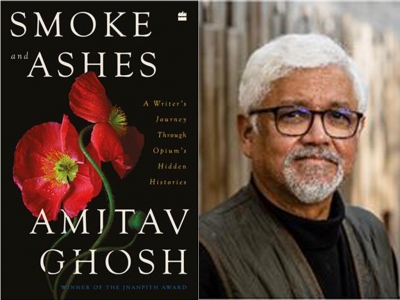New Delhi– Opium nearly smoked out China, made Britain acquired tainted wealth and laid the foundation of the fortunes of many a notorious trading house, most infamously Jardine Matheson, and made a number of early 19th-century Bombay Parsi families, who were middlemen in the East India Company’s illicit opium trade, very rich.
And it continues to have a baneful influence because it is the life-blood of global narco terrorism.
Celebrated author Amitav Ghosh’s next book, ‘Smoke and Ashes’, to be released by HarperCollins India’s Fourth Estate imprint on July 15, is, in the words of its sub-title, ‘A Writer’s Journey Through Opium’s Hidden Histories’.
Ghosh said in an announcement issued by his publishers that his upcoming book is “based on the enormous quantities of material I accumulated while researching the trilogy of novels [The Ibis Trilogy] I wrote between 2005 and 2015.”
Delving into the making of ‘Smoke and Ashes’, Ghosh said: “When I started writing the novels I thought they would be mainly about the transportation of indentured workers from India to Mauritius in the early nineteenth century. But in the course of my research, and much to my surprise, I stumbled upon a different trade in a precious commodity that was being carried in large quantities from India to China — opium!”
‘Smoke and Ashes’, which is “at once a travelogue, a memoir and an excursion into history, both economic and cultural,” is the story of how, under the aegis of the British Empire, India became the world’s largest producer of opium between the eighteenth and nineteenth centuries, and the different conditions under which opium was produced in various regions, with lasting effects for those areas.
Interestingly, to safeguard their opium trade with China, the East India Company outlawed its use in India, although opium poppy seeds, known as posto in Bengal, entered the cuisine of the state and became a definitive staple of the Bengali diet.
‘Smoke and Ashes’, according to Ghosh, also traces the transformative impact that the opium trade had on India, China, Britain and the United States, with profound long-term consequences for the birth of the modern world, and of contemporary globalism.
“Many of the world’s biggest corporations got their start in the colonial opium trade,” Ghosh pointed out. “But the opium economy also had significant effects at the microlevel, influencing migration and settlement patterns, and touching upon millions of lives, including those of my own forefathers.”
He added: “This story is remarkable, and revelatory, because at the heart of it lies a plant — the opium poppy. While many other plants, like sugarcane, tobacco and cotton, have played major roles in history, their importance has faded over time.
“The opium poppy, on the other hand, has gone from strength to strength; it is now more powerful than ever, manifesting itself in the devastating opioid crisis that currently grips the globe.”
‘Smoke and Ashes’, Ghosh concluded, “tells the story of how this common and deceptively humble plant has shaped the modern world, and the key part it is now playing in the unmaking of that world.”
HarperCollins India will be the first to publish Smoke and Ashes, in July, which is only appropriate because their editorial teams have given me huge and whole-hearted support throughout the writing of the book. I am very excited about the publication of the book!” (IANS)














